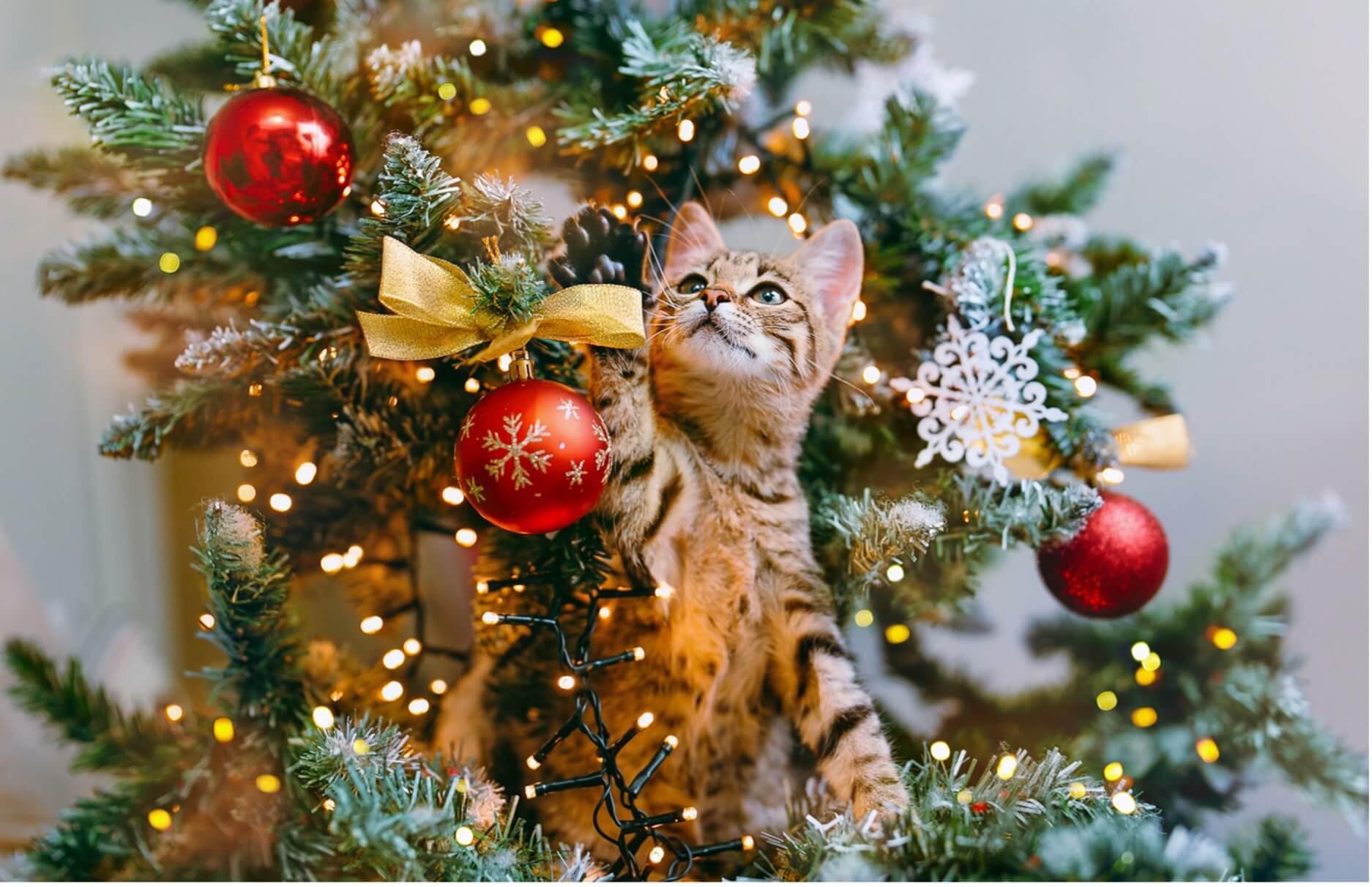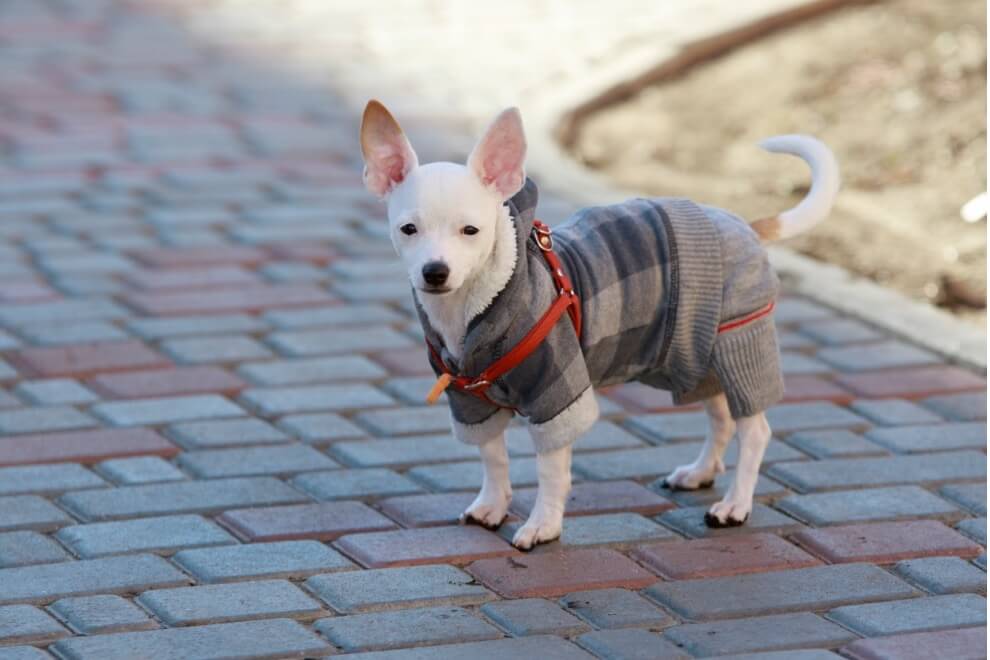The Christmas holiday is here. As you prepare for the celebrations and fun times with family and friends, we would like to remind pet parents of the hazards to pets that come with the holiday.
Nothing can ruin a holiday like an accident that injures or takes the life of a precious pet.
A quick review of the following list can avert disaster for your pet, so I encourage everyone to follow them and keep them safe throughout the holiday season.
Keep Your Pets Away from People’s Food
Some foods we eat can cause mild to severe stomach upset, while others can be highly toxic and cause death in a pet. Here are some of the most dangerous holiday foods that are toxic to animals:
- Chocolate, Coffee, and Caffeine
- Poultry bones
- Nuts
- Alcohol
- Raisins and grapes
- Xylitol
- Yeast dough
- Onions, Garlic, Chives
- Avocado
A Safe Rule of Thumb
To avoid an emergency over the holidays, play it safe. Keep all people food away from your pets. Also, if you have guests, ensure they know not to feed your pet any of their food nor leave any dropped food on the floor or ground for your pets to snatch up!
Protect Your Pets from Holiday Decorations

At first glance, holiday decorations may seem harmless. But realize these are new items in your home, and most pets will be curious about them and want to check them out.
Tinsel & Ornaments
These shiny objects attract pets who may want to play with them, chew on them, or eat them.
If you have pets, I recommend you have non-breakable ornaments. Tinsel can result in severe damage to your pet's intestines if ingested. For example, when a cat swallows something stringy that wraps around the tongue's base or anchors itself in the stomach, it cannot pass through the intestines. As the intestines contract and move, this tinsel or other objects (string, yarn, ribbon, etc.) can slowly cut through the tissue. This cutting can severely damage a cat's intestinal tract, become life-threatening, and involve expensive abdominal surgery.
Electrical Cords
Maybe your pet does not typically chew on electrical cords. But when you put up your Christmas tree, this is something new to them. They may get attracted to Christmas light cords. Electrical shock may occur when a pet bites down on an electrical cord causing deep cuts or tears in its tongue and possible death. Check your holiday lights for signs of fraying or chewing, and use a grounded three-prong extension cord as a safety precaution. Keep your lights off when you are not around to supervise your pets. You can also purchase cord protectors such as the Chewsafe Cord Cover, PetCords Dog & Cat Protector.
You can call us or Pet Poison Helpline for treatment advice if you suspect your dog or cat has been electrocuted or eaten tinsel.
Decorative Flowers and Plants
Poinsettias, Lilies, Amaryllis, and Holly, are popular Christmas decorations. Unfortunately, they are toxic to pets. But here are some beautiful alternatives.
- Red roses instead of Poinsettias
- White Orchids instead of Lilies
- Achira instead of Amaryllis
- Autumn Olive instead of Holly
Protect Your Pets from the Cold Weather

Just like people, pets' cold tolerance can vary from pet to pet based on their coat, body fat stores, activity level, and health.
Long-haired or thick-coated dogs tend to be more cold-tolerant but are still at risk in cold weather. Short-haired pets feel the cold faster because they have less protection.
Pets with diabetes, heart disease, kidney disease, or hormonal imbalances (such as Cushing's disease) may have difficulty regulating their body temperature. They may be more susceptible to problems from temperature extremes. The same goes for very young and older pets. Consult your veterinarian if you need help determining your pet's temperature limits.
We recommend always keeping cats inside (unless you have a secure outdoor cat enclosure for use during nice weather or take your cat on walks using a harness). Accompany your dog outdoors when they need to relieve themselves or get some exercise. Keep in mind that if you feel cold and want to go back inside, your pet is getting cold too.
Cold Weather Tips for Walking Your Pet
Wipe down your pet with a towel immediately when they come in from the outside.
Repeatedly coming into the heat of your house after being out in the cold can cause itchy, flaking skin. Towel-drying your pet as soon as they come in helps prevent dry skin.
Let your pet's coat grow.
Never shave your dog or cat in the winter. A longer coat will provide more warmth. If your dog is short-haired, you can consider getting him a coat or sweater with a high collar or turtleneck with coverage from the base of the tail to the belly.
Bathe your pets as little as possible during cold spells.
Washing too often can remove essential oils and increase the chance of developing dry, flaky skin. If you need to bathe your pet, ask your vet to recommend a moisturizing shampoo or rinse.
Protect their paw pads.
You can purchase paw balms to rub onto your pet’s paw pads before going outside to protect them from the cold. Booties provide even more protection if your pet will wear them.
Watch for signs that your pet may be getting too cold.
If your pet is whining, shivering, appearing anxious, slowing down or stopping, or looking for a warm place to burrow, you need to bring them inside.
Finally, Be Watchful for Coolants or Antifreeze
Coolant or antifreeze is a lethal poison for dogs and cats. Unfortunately, both dogs and cats are attracted to its taste. You must thoroughly clean up any spills from your vehicle and consider using products that contain propylene glycol rather than ethylene glycol.
Our Best Holiday Wishes to You
Our team here at Advanced Pet Care Clinic wishes you a happy holiday. Please follow the above holiday tips to keep your pets safe for the holiday season and prevent unfortunate emergencies.
We are here for you. So, please, contact us if you have any questions about pet’s safety or anything else regarding your pet.
Dr. Tammy Stevenson

